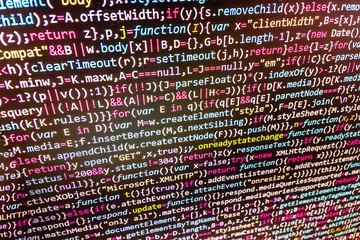
PUBLISHER'S NOTE: Artificial intelligence, once the stuff of science fiction, has become all to real in our modern society - especially in the American criminal justice system; As the ACLU's Lee Rowland puts it: "Today, artificial intelligence. It's everywhere — in our homes, in our cars, our offices, and of course online. So maybe it should come as no surprise that government decisions are also being outsourced to computer code. In one Pennsylvania county, for example, child and family services uses digital tools to assess the likelihood that a child is at risk of abuse. Los Angeles contracts with the data giant Palantir to engage in predictive policing, in which algorithms identify residents who might commit future crimes. Local police departments are buying Amazon's facial recognition tool, which can automatically identify people as they go about their lives in public." The algorithm is finding its place deeper and deeper in the nation's courtrooms on what used to be exclusive decisions of judges such as bail and even the sentence to be imposed. I am pleased to see that a dialogue has begun on the effect that increasing use of these logarithms in our criminal justice systems is having on our society and on the quality of decision-making inside courtrooms. As Lee Rowland asks about this brave new world, "What does all this mean for our civil liberties and how do we exercise oversight of an algorithm?" In view of the importance of these issues - and the increasing use of artificial intelligence by countries for surveillance of their citizens - it's time for yet another technology series on The Charles Smith Blog focusing on the impact of science on society and criminal justice. Up to now I have been identifying the appearance of these technologies. Now at last I can report on the realization that some of them may be two-edged swords - and on growing pushback. (The following Tech Republic story, complete with some spectacular examples of misidentification), goes to the accuracy of facial recognition technology - and in particular the need to proceed with caution as "The implementation of face surveillance AI is real, and so are the problems and risks associated with it.")
Harold Levy: Publisher; The Charles Smith Blog:
------------------------------------------------------------
PASSAGE OF THE DAY: "Controversy surrounding the use of Amazon Rekognition isn't new, particularly since it's been tailored to be used by law enforcement. A report from Gizmodo displays previous faults in the facial recognition technology, citing a training presentation that matches a picture of O.J. Simpson to a white male with long hair and a mustache. A disproportionate number of mismatched images were people of color, which further supports the ACLU's reasoning for pushing back on law enforcement's use of face recognition technology, the post said. If law enforcement is implementing Amazon Rekognition, false identification could provide false bias to an officer before a situation even starts, explained the post. The ACLU emphasized how their test method wasn't a "hypothetical exercise," as Amazon is marketing their facial recognition software primarily to police. In fact, the ACLU noted that a police station in Oregon started using Amazon Rekognition to scan people's faces against a mugshot database. The implementation of face surveillance AI is real, and so are the problems and risks associated with it."
STORY: "Amazon AI misidentifies Congress as criminals, proves it's not ready for enterprise," by reporter
Macy Bayern published by Tech Republic on July 27, 2018."
SUB-HEADING: "Amazon's face recognition falsely identified 28 members of Congress as criminals. Perhaps AI isn't quite ready for business."
GIST: "Amazon's face recognition AI incorrectly matched 28 members of Congress with criminal mugshots, according to an ACLU blog post on Thursday. Using Amazon's Rekognition software—the exact same facial recognition system offered to the public—the ACLU conducted the experiment with a database of 25,000 publicly-available mugshots and photos of every member of Congress, said the post. Controversy surrounding the use of Amazon Rekognition isn't new, particularly since it's been tailored to be used by law enforcement. A report from Gizmodo displays previous faults in the facial recognition technology, citing a training presentation that matches a picture of O.J. Simpson to a white male with long hair and a mustache. A disproportionate number of mismatched images were people of color, which further supports the ACLU's reasoning for pushing back on law enforcement's use of face recognition technology, the post said. If law enforcement is implementing Amazon Rekognition, false identification could provide false bias to an officer before a situation even starts, explained the post. The ACLU emphasized how their test method wasn't a "hypothetical exercise," as Amazon is marketing their facial recognition software primarily to police. In fact, the ACLU noted that a police station in Oregon started using Amazon Rekognition to scan people's faces against a mugshot database. The implementation of face surveillance AI is real, and so are the problems and risks associated with it. Amazon Rekognition's flaws reveal how AI may not be ready for its primetime in business, with still many kinks to work out. Discussions surrounding face recognition technology in business have been increasingly popular. From talk of applications in healthcare, retail, security, marketing, banking, and more, facial recognition software could have a presence in almost any market. However, the ACLU's analysis proves that the AI implementation may not be quite ready for the enterprise."
SUB-HEADING: "Amazon's face recognition falsely identified 28 members of Congress as criminals. Perhaps AI isn't quite ready for business."
GIST: "Amazon's face recognition AI incorrectly matched 28 members of Congress with criminal mugshots, according to an ACLU blog post on Thursday. Using Amazon's Rekognition software—the exact same facial recognition system offered to the public—the ACLU conducted the experiment with a database of 25,000 publicly-available mugshots and photos of every member of Congress, said the post. Controversy surrounding the use of Amazon Rekognition isn't new, particularly since it's been tailored to be used by law enforcement. A report from Gizmodo displays previous faults in the facial recognition technology, citing a training presentation that matches a picture of O.J. Simpson to a white male with long hair and a mustache. A disproportionate number of mismatched images were people of color, which further supports the ACLU's reasoning for pushing back on law enforcement's use of face recognition technology, the post said. If law enforcement is implementing Amazon Rekognition, false identification could provide false bias to an officer before a situation even starts, explained the post. The ACLU emphasized how their test method wasn't a "hypothetical exercise," as Amazon is marketing their facial recognition software primarily to police. In fact, the ACLU noted that a police station in Oregon started using Amazon Rekognition to scan people's faces against a mugshot database. The implementation of face surveillance AI is real, and so are the problems and risks associated with it. Amazon Rekognition's flaws reveal how AI may not be ready for its primetime in business, with still many kinks to work out. Discussions surrounding face recognition technology in business have been increasingly popular. From talk of applications in healthcare, retail, security, marketing, banking, and more, facial recognition software could have a presence in almost any market. However, the ACLU's analysis proves that the AI implementation may not be quite ready for the enterprise."
- The big takeaways for tech leaders:Amazon's face recognition software misidentified 28 members of Congress, matching them to publicly available criminal mugshots. — ACLU, 2018
- The flaws in Amazon Rekognition's programming reveal how this type of AI technology may not be accurate enough for businesses to use. — ACLU, 2018;
- ----------------------------------------------------
- The entire story can be read at the link below: https://www.techrepublic.com/

article/amazon-ai- misidentifies-congress-as- criminals-proves-its-not- ready-for-enterprise/?ftag= TREe09998f&bhid= 264951540073812642686889829558 26

Harold Levy: Publisher; The Charles Smith Blog;
---------------------------------------------------------------------
